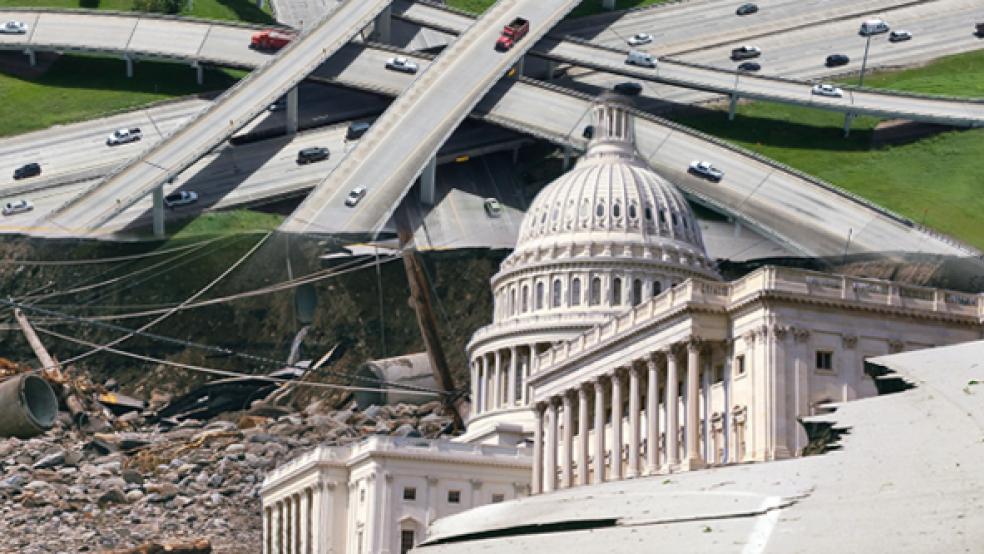The horrific murder of a minister and eight parishioners at an historic black church in Charleston, S.C. hung over President Obama’s speech last Friday to the United States Conference of mayors in San Francisco.
“The apparent motivations of the shooter reminds us that racism remains a blight that we have to combat together,” Obama told a large audience including many black mayors. “We have made great progress, but we have to be vigilant because it still lingers.”
Related: Can Congress Keep the Economy from Driving into a Pothole?
The subtext to the president’s lengthy speech to city officials was Obama’s frustration with Congress and the litany of unfinished business on Capitol Hill – much of it regarding spending programs and policies with vital implications for cities and states.
When he first addressed the mayors as a presidential candidate in 2008, Obama said, “American cities shouldn’t be succeeding despite Washington, they should be succeeding with some help from Washington.”
Since then, Obama said local and state officials have often learned the hard way that it is a mistake to count too heavily on Washington for a timely response to urban needs. In terms of important economic priorities like supporting working families, improving education, creating jobs and providing affordable housing, “cities are not standing still” while Congress dithers, the president said.
Here are several cases in point:
- Congress and the administration have been deadlocked for more than a year over funding a new, long-term program to rebuild highways, bridges and other infrastructure. Although the Federal Highway Trust Fund has long been on the verge of bankruptcy, lawmakers have repeatedly approved patchwork extensions of federal transportation programs.
“There’s not a mayor here who can’t reel off 10 infrastructure projects right now that you’d love to get funding for,” Obama said.
Related: Obama’s Global Warming Warning: It Can Make You Sick
- Republicans and the Administration are locked in a bitter battle over Obama’s efforts to combat global warming with tough new regulations to limit carbon emissions by coal-fired power plant and other industries. Utilities and the coal industry are challenging the Environmental Protection Agency’s Clean Power Plan in court.
Obama noted that “a lot of cities have gone far ahead” of their states and the federal government to address climate change with local ordinances and rules.
- Congressional Republicans and Democrats are battling over new, fiscal 2016 spending levels for defense and domestic programs, with GOP leaders committed to lifting tough caps on defense spending while leaving them on domestic programs. If the Republicans prevail, it likely would mean sharp across the board cuts or “sequestration” of grants to the states and funding for education, transportation, economic development and numerous social programs for the poor.
“I know many of you are worried about Congress cutting programs that are important to your city’s economic growth,” Obama said. “I’ve been clear; I will not sign bills that seek to increase defense spending before addressing any of our needs here at home.”
Not surprisingly, House Speaker John Boehner (R-OH) and Senate Majority Leader Mitch McConnell (R-KY) see the world much differently. If they had been asked, they would have provided the mayors with a much different spin as to why so much important work has been stalled.
Related: New CBO Director Renews Warning on Long-Term Debt
They would have included the Democrats’ refusal to own up to the need to begin addressing the long-term deficit and mounting entitlement costs, despite repeated warnings from the Congressional Budget Office and other budget watchdogs. And they would likely have asserted that excessive government regulations and a blizzard of Obama executive orders are thwarting even better economic growth. Finally, they would point to the billions of dollars simply wasted by poor management, incompetence and a lack of oversight that has plagued the federal government—including Congress—for decades.
Yet the president put his finger on an important truth about the changing nature of federalism in this country. After years of political gridlock and polarization in Washington, city and state leaders are going their own way instead of waiting for solutions and new policies from Washington.
Although Republicans hold their largest majorities in state legislatures and governors’ mansions across the country since the 1920s, many Democratic-controlled cities are forging their own paths, the Pew Charitable Trust’s Stateline publication reported early this year.
On issues ranging from the minimum wage and hydraulic fracking energy production to police department’s use of drones, a number of cities are acting on their own to set policy.
Related: Is Fracking Causing Earthquakes in Texas?
Over the past several years, for example, Austin, Texas—home of Whole Foods--banned plastic shopping bags. Lincoln, Nebraska blocked the use of drones by police, and Philadelphia became the largest city to decriminalize small amounts of marijuana, Stateline reported. Earlier this month, Los Angeles became the largest city to guarantee workers a minimum wage of at least $15 an hour by 2020.
In Ohio, a state that supports fracking, the cities of Athens and Oberlin opposed the destructive underground hydraulic mining of oil and gas.
In a few cases, states have begun to push back against aggressive new policies of their cities. In Texas, for example, where about 60 municipalities have some ordinances on the books limiting drilling or fracking, Republican Texas Gov. Greg Abbott recently signed legislation overriding local ordinances in response to the demands of the state’s powerful oil and gas industry.
Nonetheless, a new trend is being set by aggressive city leaders who have grown impatient with Washington and their states.
Related: The Rising Cost of Gridlock
“I think the cities have the political will and consensus to move when the federal government and the state may be paralyzed or polarized,” James Brooks, city solutions director for the National League of Cities, told Stateline.
Top Reads from The Fiscal Times:


